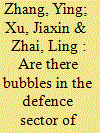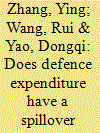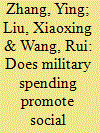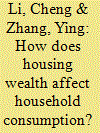|
|
|
Sort Order |
|
|
|
Items / Page
|
|
|
|
|
|
|
| Srl | Item |
| 1 |
ID:
171019


|
|
|
|
|
| Summary/Abstract |
During the past decade, China’s defence industry has experienced significant reforms, with increasing numbers of defence companies being listed on the stock market. Meanwhile, China’s stock market has suffered from dramatic fluctuations. This article, therefore, attempts to break new ground on an empirical research agenda to detect bubbles in the defence sector of China’s stock market and how these bubbles can be impacted by the entire stock market and defence industry. To explain this issue, sequential unit root tests are introduced to investigate the existence of bubbles in the defence sector using monthly frequency data from China’s stock market from January 2005 to June 2016. The empirical results show strong evidence of explosive behaviours in the defence sector during the past decade. Moreover, the number of bubbles has changed greatly when accounting for the entire stock market. The empirical results indicate that bubbles in the middle of 2006 and at the end of 2014 were driven by the defence industry because of the sharp increase of military expenditure and the release of innovative defence reforms. Finally, we suggest that the government could control the annual budget increase at a steady pace and implement defence reforms by carrying out experimental units gradually.
|
|
|
|
|
|
|
|
|
|
|
|
|
|
|
|
| 2 |
ID:
155845


|
|
|
|
|
| Summary/Abstract |
China’s defence expenditure has been growing rapidly along with GDP growth during the past two decades. Meanwhile, the income gap has continued to increase. There are conflicting views regarding whether the defence expenditure is capable of reducing income inequality. Therefore, this paper investigates the existence of any spillover effect of defence expenditure on income inequality, with a special focus on the regional differences among 31 provinces and 7 military regions in China. We extend panel cointegration and the impulse response function by using panel data during the period of 1997–2012. The empirical results show that the defence expenditure has an impact on income inequality, and the effect varies over different regions in China. The defence expenditure has a spillover effect on income inequality in the full sample panel and the southeastern panel. An increase in the defence expenditure does not crowd out social welfare spending due to the high level of economic development and government expenditure. On the contrary, in the northern panel, the effect is opposite because of the unbalanced economic development levels within the panel. Beijing as the capital of China, benefits more from the expansion of defence expenditure thus widening the income gap. In addition, the impulse response analyses further confirm a stronger effect of the defence expenditure on income inequality in the northern and the southeastern panels over a short period.
|
|
|
|
|
|
|
|
|
|
|
|
|
|
|
|
| 3 |
ID:
155841


|
|
|
|
|
| Summary/Abstract |
Whether military spending is capable of promoting social welfare is currently a controversial issue. The aim of this paper is to investigate how military spending affects the input and output of social welfare (i.e. social welfare expenditures and social welfare index). A panel cointegration analysis and an impulse response function are conducted with multi-country panel data, over two time periods, 1998–2011 and 1993–2007. In addition, to extend a comparative analysis over different economies, BRICS (i.e. Brazil, Russia, India, China, South Africa) and G7 (i.e. the US, Japan, Germany, the UK, France, Italy, Canada) countries are selected as representatives of emerging economies and developed countries, respectively. The empirical results show that military spending enhances social welfare expenditures in developed countries, while the effect is ambiguous in emerging economies. Also, military spending is capable of promoting the social welfare index based on the FMOLS estimation. The comparative analyses indicate that unlike in the G7, the effect of the growth of military spending on the growth of social welfare expenditures is negative and shorter in the BRICS.
|
|
|
|
|
|
|
|
|
|
|
|
|
|
|
|
| 4 |
ID:
182805


|
|
|
|
|
| Summary/Abstract |
Thanks to four-decade spectacular economic growth, China's households have been accumulating a stockpile of wealth. In such a context, further concerns have been raised about the relationship between wealth accumulation and improvement of economic well-being, mainly through consumption. The issue becomes even more important when considering the challenges facing China in recent years, which can be characterized by a mix of increasingly leveraged households, escalating housing price, sluggish consumption, slowing economic expansion, trade frictions with the United States, and the Covid-19 pandemic and resulting economic difficulties. With that background in mind, this paper first provides international evidence on the relationship between household consumption and wealth, especially in the form of houses. Drawing on a panel of aggregate data for fourteen countries including China, we find that household consumption positively responds to changes in housing wealth, and this link is further affected by different levels of government spending and financial development. We next relate the international evidence to the case of China, with the focus on some recent policy issues over housing regulations and consumption promotion. Importantly, as the evidence and underlying theories suggest, housing wealth-consumption association does not follow a simplistic pattern, and thus, multiple policy measures could and should be undertaken rather than merely curbing speculative activities in real estate exchanges and associated financial business.
|
|
|
|
|
|
|
|
|
|
|
|
|
|
|
|
| 5 |
ID:
092817


|
|
|
|
|
| Publication |
2009.
|
| Summary/Abstract |
This paper investigates the long-run equilibrium relationships, temporal dynamic relationships and causal relationships between energy consumption structure, economic structure and energy intensity in China. Time series variables over the periods from 1980 to 2006 are employed in empirical tests. Cointegration tests suggest that these three variables tend to move together in the long-run. In addition, Granger causality tests indicate that there is a unidirectional causality running from energy intensity to economic structure but not vice versa. Impulse response analysis provides reasonable evidences that one shock of the three variables will cause the periods of destabilized that followed. However, the impact of the energy consumption structure shock on energy intensity and the impact of the economic structure shock on energy consumption structure seem to be rather marginal. The findings have significant implications from the point of view of energy conservation and economic development. In order to decrease energy intensity, Chinese government must continue to reduce the proportion of coal in energy consumption, increase the utilization efficiency of coal and promote the upgrade of economic structure. Furthermore, a full analysis of factors that may relate to energy intensity (e.g. energy consumption structure, economic structure) should be conducted before making energy policies.
|
|
|
|
|
|
|
|
|
|
|
|
|
|
|
|
|
|
|
|
|